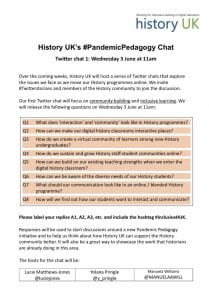Louise Creechan (GTA English Literature and Widening Participation, University of Glasgow)
This week the Pandemic Pedagogy team at History UK have been thinking about accessibility.We believe that accessibility needs to be our first consideration when we begin to plan for remote delivery. Thinking about accessibility issues from the outset ensures that we avoid making compromises or adjustments further down the line. It should go without saying that it is extremely demoralising for a student to feel like their needs were an afterthought.
Professor Chrsitine Hockings of Evidencenet offers the following definition of ‘inclusive learning’ that positions accessibility as a part of a wider pedagogical strategy, one which also includes learning design and community building as key elements for inclusivity:
‘Inclusive learning and teaching in higher education refers to the ways in which pedagogy, curricula and assessment are designed and delivered to engage students in learning that is meaningful, relevant and accessible to all. It embraces a view of the individual and individual difference as the source of diversity that can enrich the lives and learning of others.’
The Pandemic Pedagogy project is concerned about the impact of the pandemic on these essential areas of inclusive teaching practice: accessibility, learning design, and community building. Through our blog posts and Twitter interactions, we aim to collate resources and useful case studies that can help our community of historians to deliver courses remotely without compromising on inclusive learning practices.
To return to accessibility, it might seem elementary, but if teaching is inaccessible then it is ineffective. Prioritising accessibility means students do not necessarily have to go through the trauma of disclosing disabilities or life situations. Many arrangements will also in turn benefit all, including abled and neurotypical students and staff.
What arrangements are you making for accessible learning? Do you have any concerns?
What do we mean by ‘accessibility’?
Under the 2010 Equality Act, we are legally required to ‘make reasonable adjustments’ to enable our students to access their studies. This legislation applies to all protected characteristics, such as age, disability, race/ethnicity, religion, sexuality, or gender, but it also extends to adjustments that the institution must make to ensure no student is disadvantaged. Remote learning can exacerbate many additional barriers for students that may have been hidden in the classroom, such as caring responsibilities, the lack of a quiet place to work, access to suitable equipment, or an unreliable internet connection. Accessibility is about inclusion and making sure that all learners feel valued and supported.
We’ve identified three starting points for thinking about accessible remote course design: Bandwidth and Workplace Circumstances, Fatigue and Concentration Difficulties, and the Loss/Lack of Support Systems This is by no means an exhaustive list and there will be specific issues that will require additional support. In the meantime, we’ve included some points of reflection with each example. We’d like to invite you to join us on Twitter on Thursday 25th June from 2pm to share experiences, reflections, and resources, and help us develop an accessible approach to remote learning. Use #PandemicPedagogy and/or #InclusiveHUK.

Key Accessibility Issues
Bandwidth and Workplace Circumstances
Synchronous video conferencing platforms, such as Zoom or MS Teams, require significantly higher bandwidths to function effectively. These high-bandwidth technologies rely on newer computers and operating systems, fast broadband connections, or significant data allowances on mobile devices. Participation in real-time, face-to-face contact via video software can marginalise students from rural communities (or abroad) with poor signal or those who cannot afford the significant financial burden of high-end technologies.
We must also respect that finding a quiet place to work may not be possible for many students for a multitude of reasons, including caring responsibilities, financial circumstances, and changed familial dynamic as a result of COVID-19. In these cases, ensuring access to recorded material, collaborative writing tasks, or discussion forums can enable students to remain engaged with the course, but at a time that is convenient for them.
What has been your experience with asynchronous resources? What did you use? How have students responded?
See this article from DePaul University for a breakdown of low-bandwidth and asynchronous approaches.
Fatigue and Concentration Difficulties
No matter how driven we are, there will be times when our concentration is severely affected by external factors. The pandemic is a cause for concern for many of us and our students are no different.
In a survey conducted by Disabled Students UK, increased levels of fatigue were commonly mentioned by respondents. It is important to note that, while respondents self-identified as disabled, the fatigue reported was not solely related to their disabilities, but the result of the changing study arrangements and the emotional toll of ensuring that their support remained in place. Ensuring that course design is informed by accessible pedagogical practices is a way of mitigating some of the stresses felt by students with additional needs.
Of course, we can all feel fatigued when we have dramatically altered our routines and working conditions. It’s been fairly well documented that the online platforms that we’ve been using to support remote learning can cause ‘Zoom fatigue’. Psychologists have determined that video platforms impair our ability to process non-verbal cues which forces the brain to focus harder on verbal dialogue and, in turn, tires us out.
To counteract fatigue and concentration issues, we should really be asking ourselves: ‘does this interaction/pre-recording need to be any longer than twenty minutes?’ If so, it may be worth rethinking your strategy: Can you plan a comfort break? Can you set students an off-screen activity for 10/15 minutes? Could this be covered by setting reading and encouraging responses on a forum?
What tactics have you employed to manage fatigue? How can course design be implemented to avoid burnout?
Loss/Lack of Support Systems
Isolation from friends, families, or situations where the student is estranged from their families can make studying far more challenging. In order to create a truly inclusive environment, we need to treat isolation as an accessibility issue. We will return to community building and transitions to HE later in the Pandemic Pedagogy project, but it is worth noting that, through conscious efforts to encourage student interaction and by making the effort to design our courses with collaboration in mind, we can hope to replicate some of the support that may have been lost in the transition to remote learning.
We need to be aware that the non-medical assistants, such as BSL interpreters, that many disabled students require will not be able to work as they would have done before the pandemic. Remember that legally you must provide captioning or a transcript for any pre-recorded material and that synchronous video conferencing makes this far more difficult. A simple way of captioning pre-recorded resources is to upload content to YouTube and to review the automatic captioning. We will provide more specific strategies for developing disability-positive classrooms in the formal Pandemic Pedagogy report that will be produced in mid-July to mark the end of the project.
Are there any strategies that you have used to support isolated students? How do we make sure that students who have lost their support systems are able to continue their studies?
Please do get in touch to share your experiences of accessible remote learning. We are keen to create a sense of coming together with other historians to ensure that we use this pandemic as a means of evolving our pedagogy and maintaining our commitment to accessibility.
Louise tweets @LouiseCreechan


You must be logged in to post a comment.